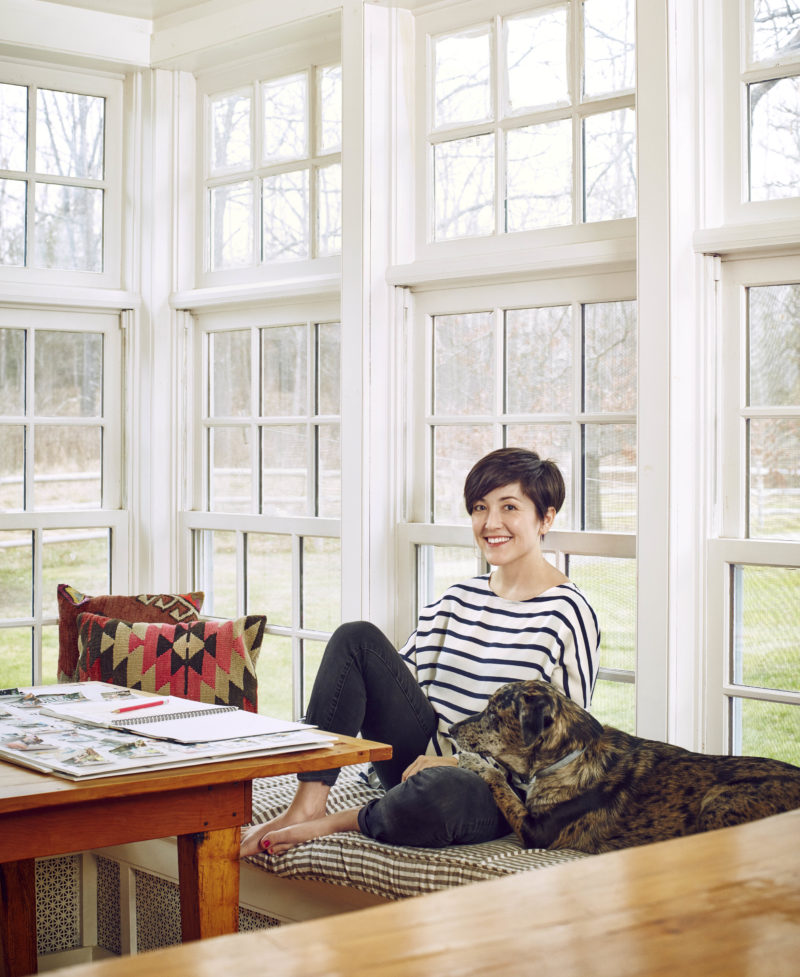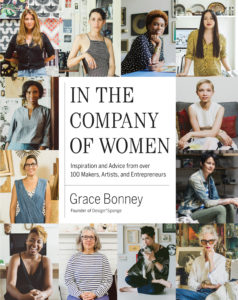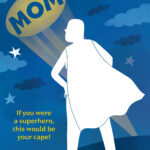Workman interviews Grace Bonney, creator of Design*Sponge and author of In the Company of Women: Inspiration and Advice from over 100 Makers, Artists, and Entrepreneurs, available for preorder now!
Q: Why did you write this book?
Grace Bonney: I started my blog, Design*Sponge, in 2004 with a focus on furniture and objects, but I soon realized that the most interesting stories were about the people and stories behind those objects. I’ve focused on helping small-business owners and makers ever since. That desire to help the people behind the work I loved so much led in 2008 to a traveling series where I provided free business advice from a range of specialists. That series turned into a weekly column on Design*Sponge called “Biz Ladies” and eventually inspired this book, because most of the business books I found didn’t reflect or include stories from women who weren’t young, white, thin, or straight.
I wanted to produce a book that would reflect the full depth and breadth of women in the business community. I wanted to see women at all stages of their careers, women from different backgrounds, women of different ages and races, and women who are as open about what they’ve learned from their failures as they are about their successes. That idea led to an epic two-month adventure around the country to meet, interview, and photograph these 107 amazing women.
Q: Why was it important for you to showcase creative women of diverse industries and backgrounds?
Grace: I open the book with a quotation from the activist Marian Wright Edelman, who said, “You can’t be what you can’t see,” and I hold that truth so closely to my heart. I’ve met so many women who’ve told me they didn’t even know their career field was an option because they’d never seen anyone who looked like them doing it. That simple act of seeing someone who looks or sounds like you or who has a shared background or life experience can alter the course of your life. I wanted to provide as many chances for readers of all ages, races, sexualities, and stages of life and business to have that experience and provide them with the inspiration they need to follow their dreams.
Q: What did you learn from the women you spotlight in the book, and how have you designed your life differently since then?
Grace: The biggest lesson I learned is that mistakes will always happen, no matter how established and successful you are. I suffered under the false idea that when you finally achieved a certain level of success, it was smooth sailing from there. But every woman I spoke with said that they still make mistakes and learn from them, even after 30 years in business. Just the other day I was speaking with the potter Frances Palmer, and she said she was still always readjusting her priorities at work, and deciding where to sell her work and what was truly worth her time and effort. That reminder that things are always changing and adjusting—that everything is always a work in progress—made me feel calmer.
Q: Of all the women you interviewed for In the Company of Women, is there a particular motto, quote, or belief that made the biggest impression?
Grace: Tavi Gevinson, the youngest business owner in the book, struck me the most with her sage words of wisdom,“Own Everything.” To be 19 and already know the importance of owning your content, your voice, and your brand is incredible. Her interview was a powerful reminder that inspiration and advice can come from women of all ages.
 Q: Among the women you interviewed are designers, artists, and makers who have a strong sense of community and interest in supporting other creators. Do you think artists have a natural inclination to transform or create an environment they want to live in?
Q: Among the women you interviewed are designers, artists, and makers who have a strong sense of community and interest in supporting other creators. Do you think artists have a natural inclination to transform or create an environment they want to live in?
Grace: Absolutely. If I’ve learned anything from working with artists for the past decade, it’s that they feel drawn to express themselves in all aspects of their professional life, from transforming their studio to creating online or in-person communities that support and protect their goals. One entrepreneur in particular that I admire is Tina Shoulders, a New York City-based designer who runs a program called Exposure Camp. Exposure Camp is a non-profit that provides young people with training and experience in fields they may not have heard about in school, like graphic and product design. She saw a need to include more people from different backgrounds in the creative community and worked hard to create a program that would ensure the next generation of up-and-coming makers and artists didn’t miss their chance to find their passion at a young age.
Q: What are the most important lessons you learned from running your own business?
Grace: The most important lesson I’ve learned in 12 years of blogging is to embrace the NOW, because what works today may not work tomorrow. The expression, “Whatever works, until it doesn’t” is always on the top of my mind. For example, after 8 years of blogging from home, our team finally got an office in Brooklyn. We loved commuting to work and packing lunches to bring…until we didn’t. Our team started to miss working from home again and instead of keeping a space that didn’t work for us anymore, we accepted that our team was happiest—and most efficient—working at home.
I’m always proud and happy when I come up with a solution at work that solves a problem and makes work easier. But what works this year may not work next year when the market changes, teams change, and needs grow. So learning to embrace change and the changing needs that come with it has been a powerful work and life lesson.
Q: You write in the introduction that your goal for the book is to provide inspiration and relatable examples of women running their own businesses so any woman can see herself reflected. What kind of advice do you offer to aspiring entrepreneurs?
Grace: I always offer advice that is twofold. First: no one will know, love, or support your business the way you will. If you run your own business, you will be the person who is ultimately responsible for making the tough decisions that shape the course of your career and your brand. So trusting your own opinion is crucial. That said, I also advise people who are new to a field to learn under someone else’s wing for a while. The best place to learn what you want (and what you don’t want) is while you’re working for someone else. It’s hard to know how you’ll define yourself and your business until you’ve seen what else exists in the world, and the best way to do that is by learning with someone else who has already been working in your field for a while. It gives you a chance to look into the future and see what ideas, practices, and techniques feel right for you when you’re ready to start.
Q: Why do you think it’s important for women to help other female business owners succeed?
Grace: Tina Fey addressed this beautifully in her book, Bossy Pants, but so often women are told that there’s only one spot at the table for women; whether that’s one spot in the boardroom, one show at the gallery, or one story in a magazine. But there’s room for all of us—and we’re stronger when we work together to support each other. The women in this book prove that, and share beautiful stories of times when working together has improved their businesses from the top down.






No Comments